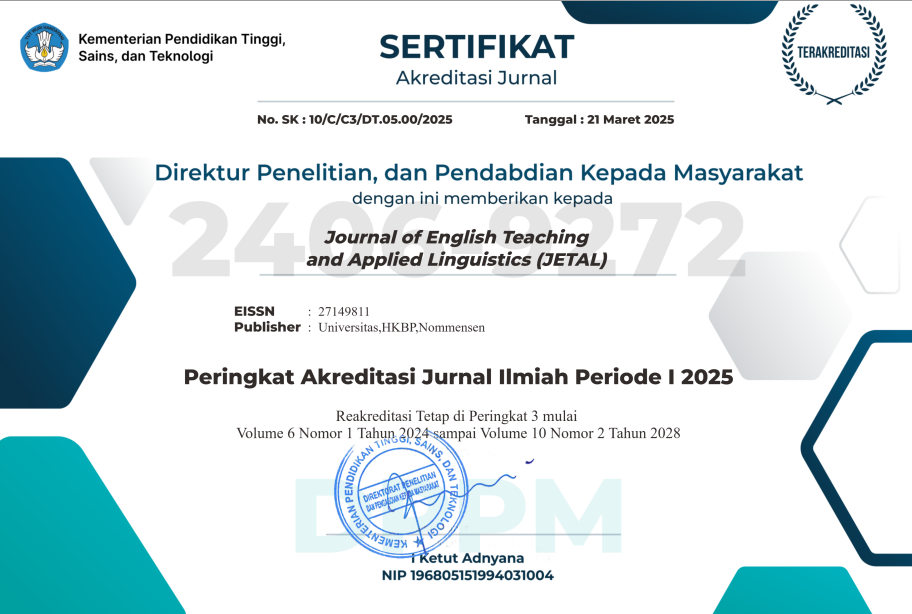ANXIETY ON LISTENING COURSE AMONG STUDENTS DURING THE PANDEMIC OF COVID -19
Abstract
Students had to continue learning activities at home during the pandemic, including listening classes. Unfortunately, several factors interfered with student comprehension in online courses and caused students to experience anxiety. This study aimed to identify several factors contributing to students' listening anxiety and discover strategies to overcome their anxiety in listening classes. This study included 30 students from SMPN 245 in Jakarta. To collect data, the researcher applied a descriptive qualitative method. The researcher used an interview as the instrument of this research. The researcher found that 22 participants of the interview experienced anxiety due to high-speed rate, concentration difficulties, lack of confidence, and nervousness. Other factors impacting students' comprehension are internet connections problem, noisy environments, and unsupportive devices. In this research, the researcher also provided several strategies students may employ to overcome anxiety.
References
Alam, I., Khusro, S., Rauf, A., & Zaman, Q. (2014). Conducting Surveys and Data Collection: From Traditional to Mobile and SMS-based Surveys. Pakistan Journal of Statistics and Operation Research, 10(2), 169. https://doi.org/10.18187/pjsor.v10i2.758
Alchamdani, A., Fatmasari, F., Anugrah, E. R., Sari, N. P., Putri, F., & Astina, A. (2020). The impact of Covid19 pandemic on online learning process in the college at Southeast Sulawesi. Jurnal Kesehatan Lingkungan, 12(1si), 129–136. https://doi.org/https://doi.org/10.20473/jkl.v12i1si.2020.129-136.
Ariga, R. A. (2019). Decrease anxiety among students who will do the objective structured clinical examination with deep breathing relaxation technique. Open Access Macedonian Journal of Medical Sciences, 7(16), 2619–2622. https://doi.org/10.3889/oamjms.2019.409.
Avci, R. (2017). The Impact of Anxiety on Listening in a Foreign Language and the Ways to Overcome Its Negative Effects. Journal of Education in Black Sea Region, 2(2). https://doi.org/10.31578/jebs.v2i2.45.
Creswell, J. W., Hanson, W. E., Clark Plano, V. L., & Morales, A. (2007). Qualitative research designs: Selection and implementation. The Counseling Psychologist, 35(2), 236–264. https://doi.org/https://doi.org/10.1177/0011000006287390.
Donovan, M., Liu, Y., & Wang, Z. (2018). Anxiety-like behavior and neuropeptide receptor expression in male and female prairie voles: The effects of stress and social buffering. Behavioural Brain Research, 342, 70–78. https://doi.org/10.1016/j.bbr.2018.01.015.
Esra, M., & Sevilen, Ç. (2021). Factors influencing EFL students' motivation in online learning: A qualitative case study. Journal of Educational Technology and Online Learning, 4(1), 11–22. https://doi.org/http://doi.org/10.31681.
Eunjoo Kim, & Whan, C. Y. (2013). Effects of intensive English-medium listening course on learners' anxieties. Korean Journal of English Language and Linguistics, 13(2), 237–264. https://doi.org/10.15738/kjell.13.2.201306.237.
Gao, L. X., Zhang, L. J., & Tesar, M. (2020). Teacher cognition about sources of English as a foreign language (EFL) listening anxiety: a qualitative study. Linguistic and Philosophical Investigations, 19, 64. https://doi.org/10.22381/LPI1920203.
Gilakjani, A. P., & Ahmadi, M. R. (2011). A study of factors affecting EFL learners' English listening comprehension and the strategies for improvement. Journal of Language Teaching and Research, 2(5). https://doi.org/10.4304/jltr.2.5.977-988.
Golchi, M. M. (2012). Listening anxiety and its relationship with listening strategy use and listening comprehension among Iranian IELTS learners. International Journal of English Linguistics, 2(4), 115. https://doi.org/https://doi.org/10.5539/ijel.v2n4p115.
Guo, Y., Xu, J., & Liu, X. (2018). English language learners' use of self-regulatory strategies for foreign language anxiety in China. System, 76, 49–61. https://doi.org/10.1016/j.system.2018.05.001.
Horwitz, A. V., Wakefield, J. C., & Lorenzo-Luaces, L. (2017). History of depression. In R. J. DeRubeis & D. R. Strunk (Eds.), The Oxford Handbook of Mood Disorders (Vol. 170, Issue 1, pp. 10–23). Oxford University Press. https://doi.org/10.1093/oxfordhb/9780199973965.013.2.
Hunt, J., & Eisenberg, D. (2010). Mental Health Problems and Help-Seeking Behavior Among College Students. Journal of Adolescent Health, 46(1), 3–10. https://doi.org/10.1016/j.jadohealth.2009.08.008
Islam, M. A., Barna, S. D., Raihan, H., Khan, M. N. A., & Hossain, M. T. (2020). Depression and anxiety among university students during the COVID-19 pandemic in Bangladesh: A web-based cross-sectional survey. PLOS ONE, 15(8), e0238162. https://doi.org/10.1371/journal.pone.0238162.
Jun, M., Lee, S., & Shim, T. (2021). First-year college student life experiences during COVID-19 in South Korea. International Journal of Environmental Research and Public Health, 18(18), 9895. https://doi.org/10.3390/ijerph18189895.
Jyoti, R. (2020). Exploring English language students' difficulties in listening comprehension. Journal La Edusci, 1(3), 1–10. https://doi.org/10.37899/journallaedusci.v1i3.125.
Lestary, N. L. G. W. (2019). The use of songs to improve students' listening. Yavana Bhasha : Journal of English Language Education, 2(2), 34. https://doi.org/10.25078/yb.v2i2.1024.
Ma’fiyah, I., Sitoresmi, U., & Yulianto, I. (2021). EFL students'perception of virtual learning in listening class: a classroom implementation. English Review: Journal of English Education, 10(1), 149–158. https://doi.org/https://doi.org/10.25134/erjee.v10i1.5365.
Mustapha, R., Mahmud, M., Burhan, N. M., Awang, H., Sannagy, P. B., & Jafar, M. F. (2021). An exploration on online learning challenges in Malaysian higher education: The post COVID-19 pandemic outbreak. International Journal of Advanced Computer Science and Applications, 12(7). https://doi.org/10.14569/IJACSA.2021.0120744.
Nofrika, I. (2019). EFL Students' Voices: The Role of YouTube in Developing English Competences. Journal of Foreign Language Teaching and Learning, 4(1), 56–73. https://doi.org/10.18196/ftl.4138.
Nurkhamidah, N. (2020). Exploring factors causing listening anxiety on generation z students. ACITYA Journal of Teaching & Education, 2(2), 141–151. https://doi.org/10.30650/ajte.v2i2.1386
Nushi, M., & Orouji, F. (2020). Investigating EFL teachers' views on listening difficulties among their learners: the case of Iranian. SAGE Open, 10(2), 215824402091739. https://doi.org/10.1177/2158244020917393.
Pan, Y. E. (2016). listening anxiety in EFL class. International Journal on Studies in English Language and Literature, 4(6), 12–16. https://doi.org/10.20431/2347-3134.0406002.
Piechurska-Kuciel, E. (2008). Chapter 4. Input, processing and output anxiety in students with symptoms of developmental dyslexia. In Language Learners with Special Needs (Vol. 31, pp. 86–109). Multilingual Matters. https://doi.org/10.21832/9781847690913-006.
Pokhrel, S., & Chhetri, R. (2021). Literature review on impact of COVID-19 pandemic on teaching and learning. Higher Education for the Future, 8(1), 133–141. https://doi.org/10.1177/2347631120983481.
Serraj, S., & Bt. Noordin, N. (2013). Relationship among Iranian EFL students' foreign language anxiety, foreign language listening anxiety and their listening comprehension. English Language Teaching, 6(5), 1–12. https://doi.org/10.5539/elt.v6n5p1.
Stæhr, L. S. (2009). Vocabulary knowledge and advanced listening comprehension in English as a foreign language. Studies in Second Language Acquisition, 31(04), 577. https://doi.org/10.1017/S0272263109990039.
Syahputri, V. N., Rahma, E. A., Setiyana, R., Diana, S., & Parlindungan, F. (2020). Online learning drawbacks during the Covid-19 pandemic: A psychological perspective. EnJourMe (English Journal of Merdeka) : Culture, Language, and Teaching of English, 5(2), 108–116. https://doi.org/10.26905/enjourme.v5i2.5005.
Syarifah, I., & Zainil, Y. (2021). Teaching and learning challenges in EFL classrooms during the pandemic era. Ninth International Conference on Language and Arts (ICLA 2020), 111–115. https://doi.org/https://doi.org/10.2991/assehr.k.210325.020.
Wadsworth, L. P., Forgeard, M., Hsu, K. J., Kertz, S., Treadway, M., & Björgvinsson, T. (2018). Examining the role of repetitive negative thinking in relations between positive and negative aspects of self-compassion and symptom improvement during intensive treatment. Cognitive Therapy and Research, 42(3), 236–249. https://doi.org/10.1007/s10608-017-9887-0.
Yasuda, T., & Nabei, L. (2018). Effects of coping strategies on language anxiety of Japanese EFL learners: Investigating willingness to communicate. Journal of Language Teaching and Research, 9(5), 905. https://doi.org/10.17507/jltr.0905.03.
Authors retain copyright and grant the journal right of first publication with the work simultaneously licensed under a Creative Commons Attribution-ShareAlike 4.0 International License (CC BY-SA 4.0) that allows others to share the work with an acknowledgment of the work's authorship and initial publication in this journal.
Authors are able to enter into separate, additional contractual arrangements for the non-exclusive distribution of the journal's published version of the work (e.g., post it to an institutional repository or publish it in a book), with an acknowledgment of its initial publication in this journal.
Authors are permitted and encouraged to post their work online (e.g., in institutional repositories or on their website) prior to and during the submission process, as it can lead to productive exchanges, as well as earlier and greater citation of published work (See The Effect of Open Access).






